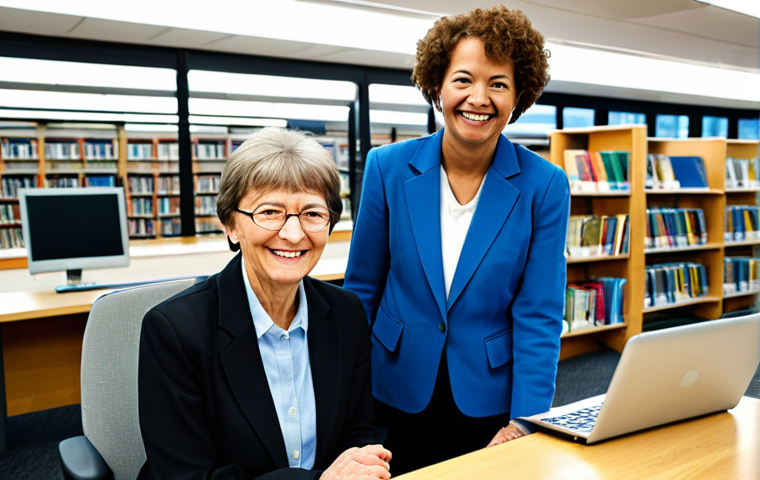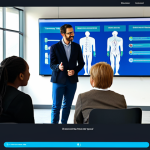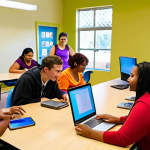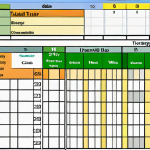Have you ever paused to consider the silent revolution happening in education, one where the act of reading and understanding extends far beyond childhood classrooms?
For me, discovering the profound impact of a literacy educator felt like finding a true calling, a realization that few roles offer such direct, tangible empowerment.
It’s not just about teaching someone to read a book; it’s about unlocking a world of opportunity, dignity, and active participation in society. This profession resonates deeply with me because I’ve personally witnessed the barriers illiteracy creates, the quiet struggles people face daily – whether it’s understanding a bus schedule, reading a prescription label, or simply engaging with the news.
Today, the role has expanded dramatically, becoming more critical than ever. We’re talking about bridging digital literacy gaps, helping adults navigate increasingly complex online information, and ensuring every generation can engage with an AI-driven future without being left behind.
It’s about lifelong learning, fostering critical thinking, and building community resilience from the ground up. The sheer joy of seeing someone confidently read their child a bedtime story for the first time, or finally fill out a job application independently, is an experience that truly transcends any monetary reward.
This isn’t just a job; it’s a profound commitment to making the world a more equitable and informed place, one word at a time. It requires incredible patience, creativity, and a genuine belief in human potential, transforming lives in ways you might never have imagined.
Let’s find out exactly how this incredible path can be your next big step.
The Unseen Architects of Empowerment: Shaping Lives Through Literacy

It’s easy to overlook the silent battles fought daily by millions who struggle with what many of us take for granted: reading and understanding. When I first stumbled upon the world of adult literacy education, I honestly hadn’t fully grasped its profound implications.
I thought it was just about teaching ABCs, but oh, how wrong I was! From my own firsthand experience, I’ve seen that the role of a literacy educator is far more expansive and deeply impactful than simply imparting basic reading skills.
It’s about unlocking entire worlds for individuals, helping them navigate a society that increasingly demands strong literacy, both traditional and digital.
We often find ourselves working with people from diverse backgrounds – new immigrants learning English, adults who missed out on foundational schooling, or even seniors trying to adapt to online banking and telehealth appointments.
Each interaction is a journey of discovery, not just for the learner, but for me as well, as I witness their incredible resilience and hunger for knowledge.
It’s an ongoing process of adapting my teaching methods, understanding unique learning styles, and celebrating every single victory, no matter how small it might seem from the outside.
The Diverse Faces of Literacy Learners: More Than Just Beginners
When you think of someone needing literacy support, your mind might automatically go to a child, but the reality in this field is vastly different and incredibly varied.
I’ve worked with a grandmother who desperately wanted to read bedtime stories to her grandchildren, a young man striving to pass his driver’s license exam, and even a skilled tradesperson who needed to understand safety manuals written in complex jargon.
Each individual arrives with their own story, their own set of motivations, and often, a quiet sense of shame or frustration that they’ve carried for years.
It’s truly humbling to be the person who gets to help dismantle those barriers. What really strikes you is the sheer courage it takes for an adult to admit they need help with something so fundamental, to sit down and learn phonics or grammar rules they might have missed decades ago.
We’re not just teaching words; we’re teaching agency, confidence, and the ability to participate more fully in their communities and families. It’s a privilege to witness that transformation, that moment when a concept clicks, or a difficult word is finally pronounced correctly, and a spark ignites in their eyes.
Bridging the Digital Divide: A New Frontier of Literacy
In today’s fast-paced, technologically driven world, literacy has evolved far beyond traditional print. My work increasingly involves what we call “digital literacy,” which is a whole different ballgame.
It’s no longer enough to just read a newspaper; people need to understand how to safely browse the internet, identify fake news, manage online banking, use email for communication, and navigate complex government websites.
I’ve spent countless hours guiding individuals through the labyrinth of online forms, explaining the nuances of cybersecurity, and showing them how to use video calls to connect with loved ones.
It can be incredibly frustrating for someone who is already struggling with basic reading to then confront an entirely new set of digital challenges. The digital divide is real, and it often disproportionately affects older adults or those from lower socio-economic backgrounds.
My role isn’t just about teaching them *how* to click a mouse, but *why* certain digital practices are safe and how they can leverage technology to improve their quality of life.
The satisfaction of seeing someone successfully set up their first email account or video chat with their family overseas is immeasurable. It means they are less isolated, more connected, and better equipped to handle the demands of modern life.
The Multifaceted Skillset of a Modern Literacy Educator
Becoming a truly effective literacy educator isn’t just about knowing how to teach grammar or phonics; it demands a rich tapestry of interpersonal skills, pedagogical adaptability, and an unwavering well of empathy.
You need to be a detective, figuring out individual learning styles and barriers; a psychologist, building trust and confidence; and a relentless cheerleader, celebrating every tiny triumph.
I’ve personally found that patience is absolutely paramount – some concepts take dozens of repetitions, and you have to find new, creative ways to explain the same idea without making the learner feel inadequate.
It also means staying updated on the latest research in adult learning theory and adopting innovative teaching strategies. The field is dynamic, and what worked perfectly for one learner might completely fail for another.
It’s a continuous learning curve, always pushing me to refine my approach and expand my toolkit. The unexpected challenges are often the most rewarding, forcing me to think outside the box and discover new methods that ultimately benefit more people.
Crafting Tailored Learning Paths: Beyond One-Size-Fits-All
One of the most challenging, yet profoundly satisfying, aspects of this profession is the necessity of individualization. Unlike a traditional classroom where you might follow a rigid curriculum, adult literacy education thrives on bespoke learning plans.
I start by conducting informal assessments to understand a learner’s current literacy levels, their specific goals, and their preferred learning styles.
Do they learn best through visual aids? Are they hands-on learners who benefit from practical exercises? Do they respond well to auditory cues?
It’s a bit like being a personalized coach. For instance, I once worked with a construction worker whose primary goal was to read blueprints; our sessions focused heavily on technical vocabulary and spatial reasoning through real-world examples, rather than just abstract grammar exercises.
Another learner, a young mother, wanted to read children’s books, so we spent time on sight words commonly found in picture books and practiced reading aloud.
This personalized approach not only makes the learning process more engaging and relevant but also significantly boosts motivation and retention. Seeing their engagement soar when the material directly relates to their lives is truly inspiring.
Empathy and Trust: The Cornerstones of Effective Instruction
I can’t stress enough how vital empathy and trust are in this role. Many adult learners carry with them past negative experiences with education, perhaps feeling overlooked or even shamed in school.
They might be apprehensive, embarrassed, or deeply insecure about their literacy levels. My first priority is always to create a safe, non-judgmental space where they feel comfortable sharing their struggles and celebrating their progress.
This means actively listening, validating their feelings, and consistently reminding them of their inherent intelligence and capabilities. I remember one learner who was terrified to read aloud, her voice trembling with anxiety.
We started with whispered readings, then reading to a pet, gradually building up her confidence until she could read clearly and proudly. It wasn’t just about the words on the page; it was about healing old wounds and rebuilding self-esteem.
Without that foundation of trust and a deep understanding of their emotional landscape, even the most brilliant teaching techniques would fall flat.
The Ripple Effect: Broader Societal Contributions of Literacy
The impact of a literacy educator extends far beyond the individual learner, creating a profound ripple effect that strengthens families, communities, and even the national economy.
When someone becomes literate, they gain greater independence, are better able to participate in civic life, and often experience improved health outcomes.
This isn’t just theoretical; I’ve seen it firsthand. A person who can read health information is more likely to take their medication correctly or understand preventative care.
Someone who can read polling information is more likely to vote and engage with local governance. It’s about building a more informed, resilient, and equitable society from the ground up.
| Area of Impact | Direct Benefit to Learner | Broader Societal Benefit |
|---|---|---|
| Economic Empowerment | Increased employability, higher earning potential, better financial literacy. | Stronger workforce, reduced welfare dependency, increased tax revenue. |
| Health & Well-being | Ability to read prescriptions, understand health information, navigate healthcare systems. | Healthier communities, reduced burden on healthcare services, improved public health outcomes. |
| Civic Engagement | Ability to read news, understand policies, vote, participate in community discussions. | More informed electorate, stronger democratic participation, active citizenship. |
| Family & Intergenerational | Can help children with homework, read bedtime stories, serve as a role model. | Improved educational outcomes for future generations, stronger family units. |
| Personal Growth | Increased self-esteem, newfound hobbies, access to knowledge and cultural experiences. | More engaged and contributing members of society, richer cultural landscape. |
Strengthening Community Fabric: Beyond the Classroom Walls
I’ve always believed that a truly vibrant community is built on informed and engaged citizens. When individuals gain literacy skills, their ability to contribute to community life skyrockets.
They can read local notices, participate in parent-teacher associations, join community groups, and even advocate for issues that matter to them. I once had a learner who, after mastering basic reading, became a passionate volunteer at our local food bank, helping others fill out forms and navigate resources.
Her transformation was incredible; she went from feeling marginalized to becoming a vital pillar of support in her neighborhood. This often creates a positive feedback loop: as individuals become more literate and confident, they inspire others around them – their friends, family members, and neighbors – to also seek out learning opportunities.
It’s a beautiful domino effect, enhancing the collective intelligence and resilience of the entire community, making it a better place for everyone.
Economic Prosperity: The Tangible Returns of Investment in Literacy
While the human impact is what truly drives me, the economic benefits of widespread literacy cannot be overstated. A literate workforce is a more productive workforce.
Individuals with stronger literacy skills are more likely to be employed, earn higher wages, and contribute more to the economy through taxes and consumption.
Conversely, low literacy levels are directly linked to unemployment, poverty, and higher healthcare costs. Investing in adult literacy programs isn’t just a social good; it’s a smart economic strategy.
When I see someone secure a better job because they can now read job applications or follow workplace instructions, I know that this success isn’t just personal; it’s contributing to the broader economic well-being of our entire region.
It reduces reliance on social services, empowers individuals to become self-sufficient, and generally creates a more robust and adaptable labor market ready for the future.
Navigating Challenges and Celebrating Triumphs on the Literacy Journey
Like any truly meaningful profession, being a literacy educator comes with its unique set of challenges, often balanced by profoundly rewarding triumphs.
It’s not always a smooth path; there are days filled with frustration, setbacks, and moments where you question if you’re making a real difference. But then, there are those unforgettable breakthroughs that remind you exactly why you chose this path, moments that are etched into your memory forever.
One of the biggest challenges I’ve encountered is the sheer diversity of learner needs and the complex life circumstances many of them juggle. It’s not just about teaching reading; it’s often about addressing underlying issues like housing instability, transportation barriers, or childcare needs, all of which impact a learner’s ability to attend and focus.
My role sometimes extends to helping connect them with other support services, acting as a crucial bridge to resources they might not even know exist.
It requires a lot of flexibility and an unwavering commitment to meeting learners where they are, literally and figuratively.
Overcoming Hurdles: Persistence and Adaptability are Key
I often reflect on the various obstacles that learners face, and honestly, it takes immense courage for them to keep showing up. Many are balancing full-time jobs, family responsibilities, and sometimes even multiple jobs just to make ends meet.
This often means lessons have to be scheduled at unconventional hours, or sometimes, they have to miss a session due to an unexpected family emergency or a demanding work shift.
It’s vital to be understanding and adaptable, finding ways to keep them engaged even with an irregular schedule. I’ve learned that consistent encouragement and small, achievable goals are far more effective than rigid timelines.
We celebrate every new word learned, every sentence understood, every form successfully filled out. It’s a marathon, not a sprint, and my job is to ensure they don’t get discouraged along the way.
Sometimes, the biggest hurdle isn’t the content itself, but overcoming years of self-doubt and the fear of failure that they carry with them. My role involves constantly reminding them of their inherent strength and progress.
The Unforgettable Victories: Moments That Define the Profession
Despite the challenges, the triumphs in this field are truly unparalleled. There’s nothing quite like the moment a learner reads their first full sentence confidently, or when they proudly show you a letter they’ve written to a family member, or perhaps fill out a job application all by themselves.
These aren’t just small wins; they are monumental shifts in a person’s life, unlocking possibilities they might have never dreamed of. I vividly remember the day one of my older learners, who had always relied on his children to read his mail, burst into tears of joy because he could finally read his own utility bill without assistance.
It was a simple act, but for him, it represented a profound leap towards independence and dignity. These are the moments that stick with you, the ones that fuel your passion and remind you that every ounce of effort, every bit of patience, is absolutely worth it.
It’s an honor to be part of someone’s journey of transformation, watching them gain not just literacy skills, but a newfound sense of self-worth and confidence that radiates into every aspect of their lives.
Wrapping Up
As I reflect on my journey in adult literacy education, one truth resonates above all else: literacy is not merely a skill; it is a fundamental human right and a powerful catalyst for change. The dedicated educators in this field are truly the unseen architects of empowerment, quietly building bridges to brighter futures for countless individuals.
Witnessing the transformation, the surge of confidence, and the opening of new doors for our learners is a privilege I wouldn’t trade for anything. If you’ve ever considered lending a hand, or if you or someone you know could benefit from these vital services, know that the path to literacy is always open, paved with patience, empathy, and unwavering support.
The ripple effect of every learned word, every understood sentence, and every new skill acquired touches not just one life, but entire families and communities, making our world a more inclusive and equitable place for all.
Useful Resources & Information
1. Find Local Programs: Many public libraries, community centers, and non-profit organizations across the United States, the UK, Canada, and Australia offer free or low-cost adult literacy programs. A quick online search for “adult literacy programs near me” or “ESL classes for adults” can be a great starting point.
2. Online Learning Platforms: Resources like Khan Academy, Coursera, and free government educational websites often provide foundational learning modules for basic reading, writing, and digital skills. Look for courses specifically designed for adult learners that allow self-paced progress.
3. Volunteer Opportunities: If you’re looking to make a difference, consider volunteering as a literacy tutor. Organizations like ProLiteracy (US), Read Easy UK, or local literacy councils typically provide comprehensive training and resources, and the personal reward of helping someone achieve their goals is immense.
4. Supportive Environment: For learners, finding a program that prioritizes a non-judgmental, empathetic, and supportive learning environment is crucial. Don’t be afraid to ask about teaching philosophies, tutor-to-learner ratios, and whether the curriculum can be tailored to individual needs.
5. It’s Never Too Late: Whether you’re a learner embarking on this journey or supporting one, remember that age is just a number when it comes to acquiring new skills. Many adults find immense success and profound personal growth by courageously embracing their literacy journey later in life.
Key Takeaways
Adult literacy education is a transformative force, extending far beyond basic reading and writing to encompass crucial digital fluency and critical thinking skills. Dedicated educators in this field are essential, employing deep empathy, pedagogical adaptability, and highly tailored approaches to meet the diverse and often complex needs of their learners.
The profound impact of increased literacy creates a significant ripple effect, fostering greater economic empowerment, improved health outcomes, active civic engagement, and ultimately strengthening community fabrics. While the journey involves navigating various challenges, the persistence of both learners and educators leads to unforgettable triumphs that redefine lives and contribute to a more informed, resilient, and equitable society.
Frequently Asked Questions (FAQ) 📖
Q: What kind of background or qualifications do I really need to become an effective literacy educator, especially if I’m not coming straight out of a traditional teaching degree program?
A: You know, it’s funny, because when I first got into this, I thought it was all about having a specific education degree, but I quickly learned that’s just not the whole picture.
While formal training in adult education, TESOL, or even a solid background in liberal arts can be incredibly helpful – and certainly, certifications in literacy instruction are a huge plus – what truly makes an effective educator goes far beyond a diploma.
I’ve seen people from all walks of life absolutely shine in this role: retired engineers who bring an incredible knack for problem-solving to their students, stay-at-home parents with an almost superhuman level of patience, even folks who struggled with their own learning early on and now feel this deep empathy.
It’s about being a fantastic communicator, genuinely patient, and having an unwavering belief in someone’s ability to learn, no matter their age or past experiences.
Many organizations, particularly non-profits or community colleges, offer fantastic training programs, sometimes even paid internships, so you can learn on the job.
It’s about showing up with an open heart and a willingness to truly connect, because at its core, this job is deeply human.
Q: Beyond the sheer joy you described, what are some of the real, day-to-day challenges or even frustrations a literacy educator might face? It can’t always be smooth sailing, right?
A: Oh, absolutely not. Anyone who tells you it’s all sunshine and light hasn’t spent enough time in the trenches! While the breakthroughs are profoundly rewarding, there are definite hurdles.
You’ll encounter students grappling with incredibly complex personal situations – maybe they’re working multiple jobs, dealing with housing instability, or struggling with health issues – and their literacy journey sometimes takes a backseat.
Progress can be agonizingly slow, and I’ve had days where I’ve felt like we’ve taken two steps forward, only to slide one step back. There’s also the challenge of finding appropriate, engaging materials that truly resonate with adults, and let’s be real, funding for these programs can often be precarious, which adds another layer of stress.
But here’s the thing: those challenges, as frustrating as they can be, often solidify your commitment. They force you to be more creative, more adaptable, and to truly celebrate every tiny victory.
It teaches you resilience, not just for yourself, but how to foster it in others.
Q: How do you actually get started in this field, and is it possible to make a sustainable living doing it, or is it mostly volunteer work?
A: That’s a super practical and important question, because while passion fuels us, we all need to put food on the table, right? To get started, a great first step is often volunteering with a local literacy council, an adult education program at a community college, or a non-profit focusing on ESL or GED preparation.
This gives you invaluable hands-on experience and a realistic look at the day-to-day. From there, you might pursue specific certifications, like those in adult literacy, ESL, or even specialized digital literacy programs.
As for making a sustainable living, it’s definitely possible, but it really varies. While a significant portion of this work can be volunteer-driven, many positions are paid, especially within public school systems, community colleges, university extension programs, and larger non-profits that receive government or foundation grants.
You might also find opportunities in corporate training, helping employees with workplace literacy, or even in developing educational software. It might not make you a millionaire, but it absolutely offers a decent, stable living, especially when you factor in the immense satisfaction of knowing you’re genuinely changing lives.
For me, that’s a currency that often feels far more valuable than anything else.
📚 References
Wikipedia Encyclopedia
구글 검색 결과
구글 검색 결과
구글 검색 결과
구글 검색 결과





